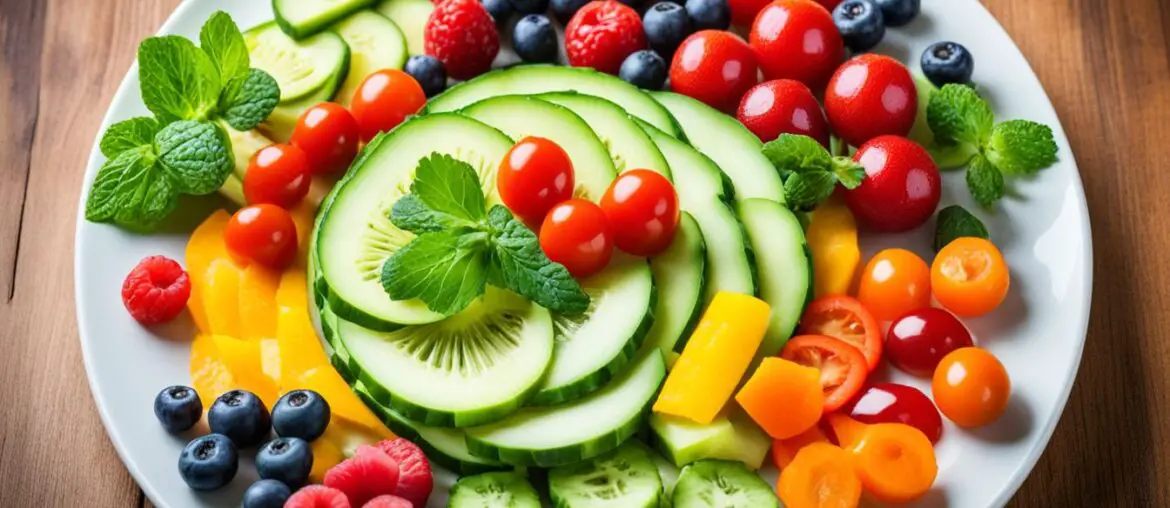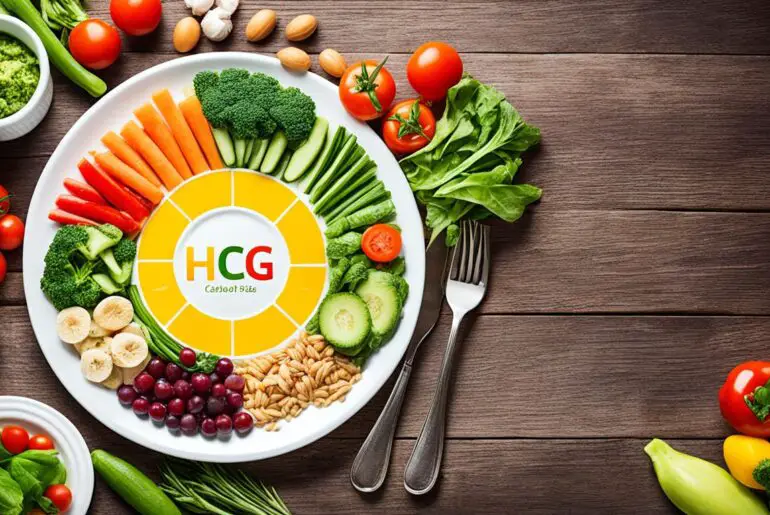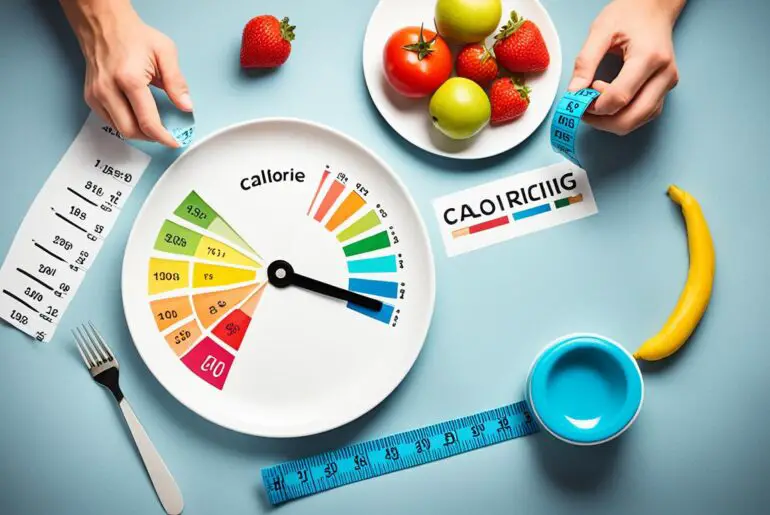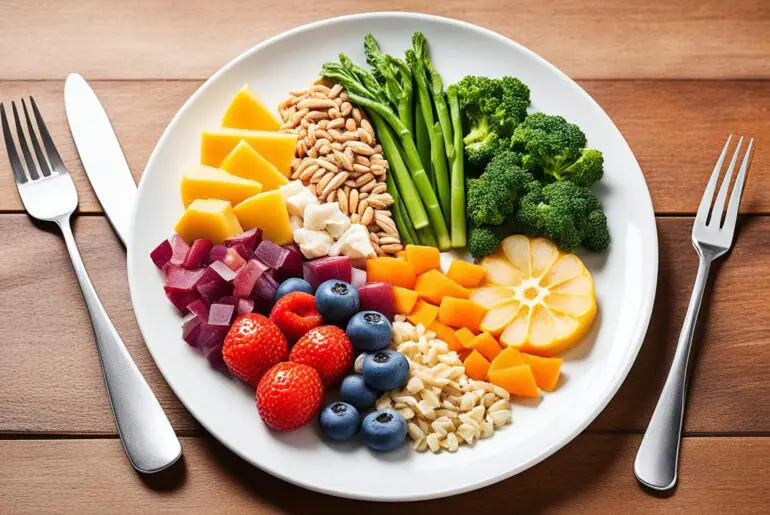Have you ever wondered how it’s possible to avoid hunger while following a low-calorie diet like the HCG protocol? Many people assume that eating as little as 500 calories a day would result in constant hunger pangs. However, dieters on the HCG phase often experience a surprising lack of appetite. So, what’s the secret behind avoiding hunger on the HCG diet?
In this article, I will debunk common misconceptions and explore the factors that can cause hunger on the HCG diet. I will also provide you with effective tips and strategies to manage and prevent hunger while on the low-calorie HCG protocol. Get ready to discover the secrets to a successful and satiating HCG diet!
Key Takeaways:
- Many people experience a lack of hunger while on the HCG phase of the HCG diet.
- The freshness of the HCG, proper loading, metabolic set point, and HCG dosage play a role in hunger management.
- Drinking plenty of water, spacing out meals, and focusing on high-fiber and high-protein foods can help prevent hunger on the HCG diet.
- Proper loading, adding extra vegetables, and ensuring sufficient HCG dosage are important for hunger control on the HCG diet.
- Managing hunger is crucial for successful weight loss on the low-calorie HCG diet.
Lack of Hunger on HCG Phase
One interesting phenomenon of the HCG phase of the HCG diet is the lack of hunger that many dieters experience while eating only 500 calories a day. This lack of hunger is normal and can sometimes be surprising to dieters who are used to experiencing food cravings. Some dieters may even have to force themselves to eat their allotted food because they are not hungry. This lack of hunger can be a positive aspect of the HCG diet and make it easier to stick to the low-calorie protocol.
Factors That Can Cause Hunger on HCG Diet

In order to successfully manage hunger on the HCG diet, it is important to understand the factors that can contribute to increased hunger levels. By addressing these factors, you can effectively suppress hunger and maintain a successful weight loss journey.
Freshness of HCG
The freshness of the HCG you use is crucial in suppressing hunger on the HCG diet. If the HCG has degraded or is past its expiration date, it may not be as effective in controlling your appetite. Therefore, it is important to ensure that you are using fresh HCG for optimal hunger suppression.
Source of HCG
The source of the HCG can also play a role in hunger levels. Some individuals caution against using HCG imported from China, as it may not meet the same quality standards as HCG obtained from other sources. It is advisable to choose a reputable and reliable source for your HCG to ensure its effectiveness in managing hunger.
Loading on HCG Diet
Skipping the loading phase of the HCG diet can lead to increased hunger during the low-calorie phase. The loading phase allows your body to build up a calorie reserve, making it easier to transition to the low-calorie phase without excessive hunger. Properly loading on the HCG diet is essential to prevent prolonged hunger.
Immunity on HCG Diet
Over time, your body may adapt to the effects of HCG, resulting in increased hunger levels. This state, commonly referred to as “immunity,” can occur when your body reaches a metabolic set point or becomes less responsive to the HCG hormone. Reaching this point can lead to a plateau in weight loss and heightened hunger. Recognizing the signs of immunity is important in adjusting your HCG protocol accordingly.
By addressing these factors, such as ensuring the freshness of your HCG, choosing a reliable source, properly loading, and recognizing signs of immunity, you can effectively manage and suppress hunger on the HCG diet.
Tips to Manage Hunger on HCG Diet
If you are experiencing hunger on the HCG diet despite doing everything correctly, there are several strategies you can try to help manage your hunger levels.
Firstly, be sure to drink plenty of water throughout the day. Staying hydrated can help curb hunger and maintain a feeling of fullness. You can also try drinking hot and herbal teas, which can have a soothing and appetite-suppressing effect.
Spacing out your meals can also be beneficial. Instead of consuming all your allotted calories in a single meal, divide them into smaller, more frequent meals throughout the day. This can help give you a continuous sense of satisfaction and prevent hunger pangs.
Focus on incorporating high-fiber and high-protein foods into your meals. These nutrient-dense options are more filling and can help keep you satiated for longer periods. Additionally, consider adding extra vegetables to your meals. Not only are they low in calories, but they also provide volume and fiber, which can contribute to a greater feeling of fullness.
Here are some tips to manage hunger on the HCG diet:
- Drink plenty of water throughout the day.
- Try drinking hot and herbal teas.
- Space out your meals into smaller, more frequent portions.
- Focus on incorporating high-fiber and high-protein foods into your meals.
- Add extra vegetables to your meals for volume and satiety.
By implementing these strategies, you can effectively manage hunger on the HCG diet and stay on track towards your weight loss goals.
Managing Hunger on the HCG Protocol
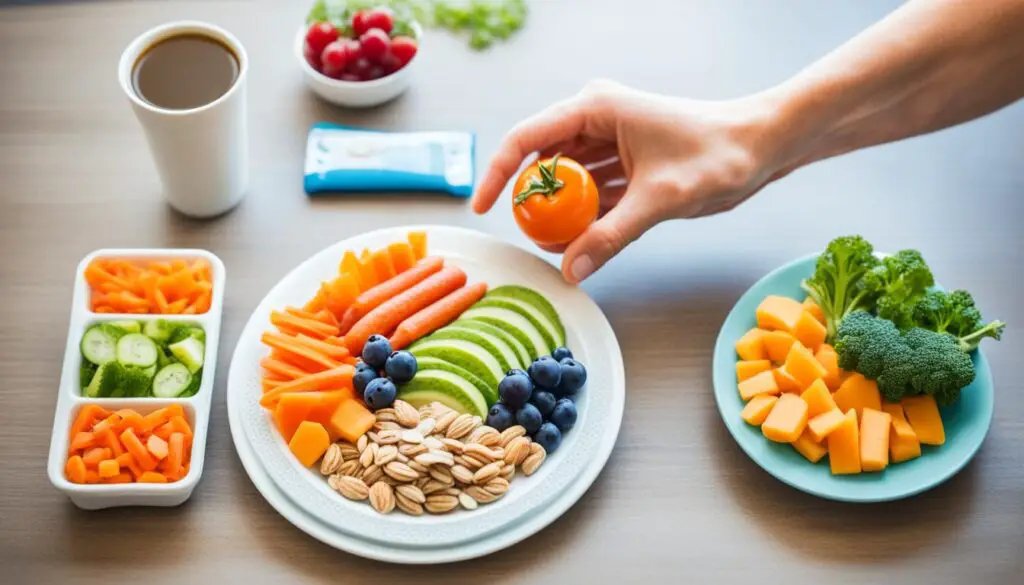
When following the HCG diet, effective hunger management is crucial for a successful weight loss journey. By implementing strategies such as meal spacing, planning, and timing, you can keep hunger at bay and stay on track with your low-calorie HCG protocol.
To manage hunger on the HCG protocol, it is recommended to space out your meals throughout the day. A typical day on the HCG diet includes having a fruit for breakfast, a protein and vegetable combination for lunch and dinner, and a fruit for an evening snack. This meal plan, combined with plenty of water and tea in between meals, can help you feel satisfied and prevent excessive hunger.
In addition to meal spacing, incorporating a hot soup into your meals can provide a feeling of fullness. The warmth and volume of the soup can help curb hunger, making it easier to adhere to the 500 calorie limit. Dr. Simeons did not enforce strict limitations on vegetable consumption, so adding extra vegetables to your meals can also contribute to hunger management while staying within the calorie limit.
When managing hunger on the HCG protocol, it’s essential to stay hydrated. Drinking plenty of water throughout the day not only helps curb hunger but also supports overall well-being. Additionally, herbal teas can be a useful tool in hunger management. Choose teas that are free of calories or artificial sweeteners to maintain the integrity of the diet.
To visually illustrate the recommended meal plan for managing hunger on the HCG protocol, here is a sample table:
| Meal | Food |
|---|---|
| Breakfast | Fruit |
| Lunch | Protein and Vegetable |
| Dinner | Protein and Vegetable |
| Evening Snack | Fruit |
Remember, managing hunger on the HCG protocol is essential for successful weight loss. By implementing meal spacing, incorporating warm soups, adding extra vegetables, and staying hydrated, you can effectively manage hunger levels and stay on track with your low-calorie HCG journey.
Importance of Proper Loading on HCG Diet
Proper loading on the HCG diet plays a crucial role in setting the foundation for a successful weight loss journey. This initial phase, known as the HCG loading phase, allows your body to adjust and prepare for the low-calorie phase that follows. By understanding the importance of proper loading and implementing some helpful tips, you can minimize hunger and maximize the effectiveness of the HCG diet.
Why is Loading on the HCG Diet Important?
The loading phase of the HCG diet involves consuming high-fat foods to provide your body with a calorie reserve. This calorie reserve helps fuel your body during the first few days of the low-calorie phase when your calorie intake is restricted to just 500 calories per day. Proper loading is essential because it helps jump-start your metabolism and encourages fat metabolism, which can aid in hunger control.
Tips for Proper Loading on the HCG Diet
- Focus on consuming high-fat foods: During the loading phase, opt for foods that are rich in healthy fats, such as avocados, nuts, olive oil, and fatty cuts of meat. Avoid high-carbohydrate foods as they can lead to excessive hunger during the low-calorie phase.
- Variety is key: Incorporate a wide range of high-fat foods into your loading phase to ensure you receive a balanced intake of essential nutrients. This will help prevent nutritional deficiencies during the low-calorie phase.
- Stay hydrated: Drinking plenty of water during the loading phase is essential to support your body’s metabolic processes and overall health. Aim to drink at least eight cups of water per day.
To illustrate the importance of proper loading on the HCG diet, here’s a table comparing the experiences of two individuals who followed different loading approaches:
| High-Fat Loading | High-Carb Loading | |
|---|---|---|
| Hunger Levels during Low-Calorie Phase | Minimal hunger due to increased fat metabolism | Increased hunger due to faster depletion of glycogen stores |
| Weight Loss Progress | Steady weight loss with better adherence to the low-calorie phase | Inconsistent weight loss with more difficulty sticking to the low-calorie phase |
| Energy Levels | Sustained energy throughout the day | Fluctuating energy levels |
By focusing on proper loading with high-fat foods, you can set yourself up for a smoother transition into the low-calorie phase of the HCG diet. This can lead to better hunger control, more consistent weight loss, and improved energy levels.
Proper loading on the HCG diet is a key component in achieving successful weight loss and hunger control. By understanding the significance of the loading phase and following the recommended tips, you can optimize the effectiveness of the HCG diet. Remember, choosing high-fat foods and staying hydrated during the loading phase can make a significant difference in your overall experience with the HCG diet.
Role of HCG Freshness in Hunger Levels
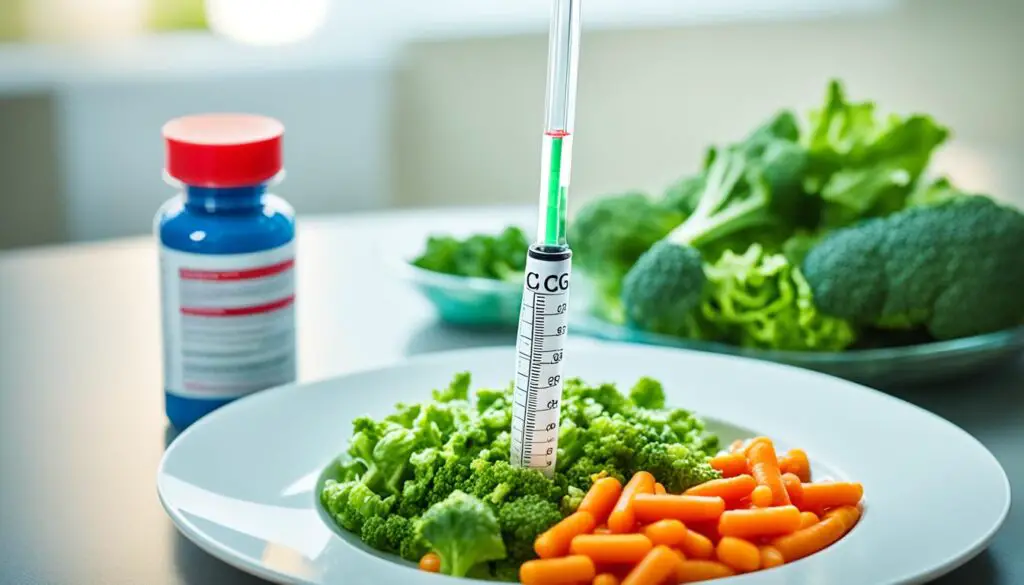
The freshness of the HCG plays a significant role in managing hunger levels on the HCG diet. When the HCG is not fresh, it may lose its potency, which can contribute to increased hunger. Factors such as HCG degradation and improper storage can affect the freshness and effectiveness of the HCG.
It is crucial to obtain fresh HCG for optimal hunger control. Ideally, HCG should be obtained every 15 days to ensure its freshness and potency. Additionally, proper storage is essential for maintaining the quality of the HCG. Storing HCG at the appropriate temperature and away from direct sunlight can help preserve its freshness and effectiveness.
It should be noted that HCG has a limited shelf life. If the HCG has been left out at room temperature for too long or is over 30 days old, it may not be as effective in suppressing hunger. Therefore, regular monitoring of the HCG’s expiration date is necessary to ensure its freshness and potency.
To summarize:
- Freshness of the HCG is crucial for managing hunger levels on the HCG diet.
- Improper storage and degradation can affect the freshness and potency of the HCG.
- Obtain fresh HCG every 15 days and store it properly to maintain its effectiveness.
- Regularly monitor the HCG’s expiration date to ensure its freshness.
By prioritizing the freshness of the HCG and following proper storage guidelines, individuals can effectively manage their hunger levels on the HCG diet.
| Factors | Impact on Hunger Levels |
|---|---|
| HCG freshness | Determines the potency of the HCG in suppressing hunger |
| Improper storage | Can lead to HCG degradation and reduced effectiveness in hunger control |
| Expired HCG | May contribute to increased hunger due to reduced potency |
Signs of Reaching “Immunity” on HCG Diet

As you progress on the HCG diet, you may encounter a phenomenon called “immunity.” This occurs when your body adapts to the effects of the HCG hormone, making it less effective for weight loss. Recognizing the signs of reaching immunity is crucial for successful diet management.
One common indication of reaching immunity is experiencing a plateau in weight loss. If you notice that your weight has remained stagnant for several days despite following the protocol diligently, it’s likely that you have reached immunity. Additionally, if you have burnt off most of your abnormal weight and still struggle with hunger, it could be a sign that the HCG is no longer providing the desired effects.
When you suspect immunity, it’s recommended to take a break from the HCG diet and transition to Phase 3. This break allows your body to reset and regain sensitivity to the hormone. During this phase, you can introduce additional foods and gradually increase your caloric intake. This break typically lasts for a minimum of six weeks but can be extended if needed.
By identifying the signs of reaching immunity and taking appropriate action, you can maximize the effectiveness of the HCG diet and continue progressing towards your weight loss goals.
Ensuring Sufficient HCG Dosage for Hunger Control
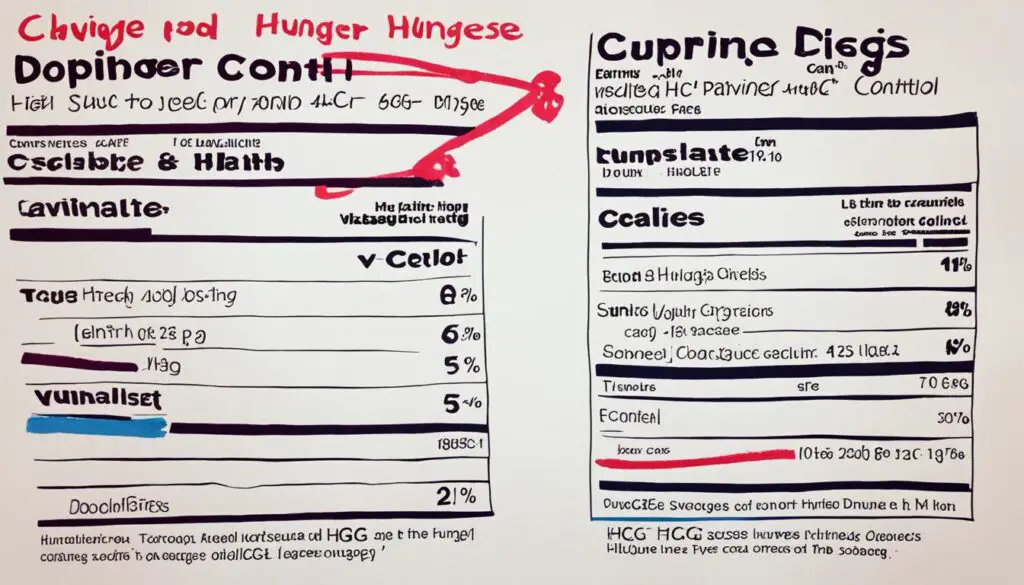
If you are experiencing excessive hunger on the HCG diet, it is crucial to ensure that you are taking the appropriate dosage of HCG. While there are products on the market claiming to simulate the effects of HCG, they may not be as effective in suppressing hunger as genuine HCG. To achieve optimal hunger control, it is essential to use authentic HCG and follow the recommended dosage.
To prevent hunger on the HCG diet, it is necessary to understand the role of HCG hormones in hunger suppression. HCG works by signaling the hypothalamus, which controls appetite and metabolism, to release stored fat for energy. This process helps to alleviate hunger and prevent muscle loss during the low-calorie phase of the HCG diet.
When it comes to HCG dosage, it is important to follow the guidelines provided by healthcare professionals or reputable sources. The recommended dosage typically ranges from 125 to 200 International Units (IU) per day, administered through injections or sublingual drops. However, it’s crucial to consult with a healthcare provider before starting the HCG diet to determine the appropriate dosage for your specific needs.
Using an insufficient HCG dosage may result in increased hunger and diminished effectiveness of the diet. It’s important to understand that the dosage may vary depending on individual factors such as weight, metabolism, and overall health. Working closely with a healthcare professional who specializes in the HCG diet can help ensure that you are receiving an adequate HCG dosage for hunger control.
Remember, taking the right amount of genuine HCG is crucial for hunger control during the HCG diet.
In summary, to effectively manage hunger on the HCG diet, it is essential to ensure sufficient HCG dosage. Use genuine HCG and follow the recommended dosage guidelines provided by healthcare professionals. By doing so, you can experience the full hunger-suppressing benefits of HCG and achieve successful weight loss on the HCG diet.
HCG Dosage Guidelines for Hunger Control
| Weight Range (lbs) | HCG Dosage (IU) |
|---|---|
| 125-150 | 125 |
| 151-175 | 150 |
| 176-200 | 175 |
| Above 200 | 200 |
Managing Hunger on HCG and Keto Diets

Hunger management is essential when following low-calorie diets like HCG and keto. While hunger can be a common issue, there are strategies that can help curb it and ensure successful weight loss. By implementing proper loading, meal preparation, and incorporating “safe” foods and drinks into your diet, you can effectively manage hunger and stay on track with your weight loss goals.
One important aspect of managing hunger is distinguishing between real hunger and cravings. Real hunger is a biological response that signals the need for nourishment, while cravings are often triggered by emotions or habits. By identifying the underlying causes of hunger, you can address them directly and prevent unnecessary snacking or overeating.
Proper loading is crucial for hunger management on both the HCG and keto diets. During the loading phase, focus on consuming high-fat foods rather than high-carb options. This jump-starts your metabolism and provides a calorie reserve for the initial days of the low-calorie phase.
Preparing allowable foods ahead of time can also help manage hunger. Having pre-portioned meals and snacks readily available makes it easier to stick to your diet plan and prevents impulsive food choices when hunger strikes. Consider using meal prep containers for portion control and convenience.
Adding “safe” foods and drinks can provide a feeling of fullness and help curb hunger on both the HCG and keto diets. Incorporate high-fiber foods like leafy greens, cruciferous vegetables, and berries to increase the volume of your meals without adding excessive calories. Additionally, consuming beverages like herbal tea, black coffee, or sparkling water can help satisfy cravings and keep you hydrated.
It’s important to consult with a healthcare professional or a registered dietitian before starting any new diet plan, including the HCG or keto diets. They can provide personalized guidance and ensure that you are meeting your nutritional needs while managing hunger effectively.
| HCG Diet Hunger Management Tips | Keto Diet Hunger Management Tips |
|---|---|
| 1. Proper Loading | 1. Increase Healthy Fat Intake |
| 2. Prepare Allowable Foods Ahead of Time | 2. Include High-Fiber Foods |
| 3. Add “Safe” Foods and Drinks | 3. Stay Hydrated |
| 4. Distinguish Between Hunger and Cravings | 4. Seek Variety in Your Meals |
By implementing these hunger management tips, you can navigate the challenges of low-calorie diets like HCG and keto more effectively. Remember to listen to your body’s hunger cues and make conscious choices that support your weight loss journey.
Conclusion
Hunger management is a crucial aspect of the HCG diet for successful weight loss. By addressing key factors that contribute to hunger, such as the freshness of the HCG, proper loading, reaching immunity, and ensuring sufficient HCG dosage, individuals can effectively control their hunger levels. Incorporating strategies like spacing out meals, incorporating high-fiber and high-protein foods, and staying properly hydrated can also help prevent excessive hunger on the low-calorie HCG diet. With these strategies in place, individuals can avoid feeling deprived and achieve their weight loss goals.
The HCG diet offers a unique experience of decreased hunger levels, which can be surprising for those accustomed to food cravings. However, it is essential to remember that hunger is a normal part of any low-calorie diet. By adopting the right strategies, individuals can manage their hunger and stay on track with the HCG protocol.
Overall, the HCG diet’s success is not only dependent on adhering to the low-calorie intake but also on effectively managing hunger. By implementing the strategies discussed in this article, individuals can overcome hunger challenges and increase their chances of achieving a successful HCG diet journey. Remember, hunger management is key to reaching your weight loss goals on the HCG diet.
FAQ
Is it common to experience a lack of hunger while on the HCG phase of the HCG diet?
Yes, it is common for dieters to experience a lack of hunger while on the HCG phase of the HCG diet. This lack of hunger can make it easier to stick to the low-calorie protocol.
What are some factors that can cause hunger on the HCG diet?
Factors that can contribute to hunger on the HCG diet include the freshness of the HCG, proper loading, reaching a metabolic set point, and taking enough HCG.
How can I manage hunger on the HCG diet?
To manage hunger on the HCG diet, you can try strategies such as drinking plenty of water, drinking hot and herbal teas, spacing out meals, focusing on high-fiber and high-protein foods, eating extra vegetables, and incorporating a hot soup into your meals.
How important is proper loading on the HCG diet?
Proper loading on the HCG diet is important to prevent excessive hunger in the initial phase. Loading on high-fat foods rather than high-carb foods can help jump-start the diet and provide a calorie reserve for the first few days.
Does the freshness of the HCG affect hunger levels on the HCG diet?
Yes, the freshness of the HCG is crucial in managing hunger levels on the HCG diet. If the HCG has degraded or is past its expiration date, it may not be as effective in suppressing hunger.
What are the signs of reaching “immunity” on the HCG diet?
Signs of reaching “immunity” on the HCG diet include a plateau in weight loss or not having enough abnormal weight to burn off. If you suspect you have reached immunity, it is recommended to take a break from the diet and move on to Phase 3.
How can I ensure sufficient HCG dosage for hunger control?
To ensure sufficient HCG dosage for hunger control, it is important to use genuine HCG and follow the recommended dosage. Some products on the market may claim to simulate the effects of HCG but may not be as effective in suppressing hunger.
Are there any tips for managing hunger on both the HCG and keto diets?
Yes, tips for managing hunger on both the HCG and keto diets include proper loading, preparing allowable foods ahead of time, and adding “safe” foods and drinks to your diet. Distinguishing between real hunger and cravings and addressing the underlying causes of hunger is also important.
How important is hunger management on the HCG diet?
Hunger management is important on the HCG diet to ensure successful weight loss. By addressing factors that can contribute to hunger and following tips to manage hunger, dieters can effectively control their hunger levels.
How can I avoid hunger on the low-calorie HCG diet?
To avoid hunger on the low-calorie HCG diet, it is important to address factors such as HCG freshness, proper loading, reaching immunity, and taking enough HCG. Other strategies include spacing out meals, incorporating high-fiber and high-protein foods, eating extra vegetables, and staying hydrated.

